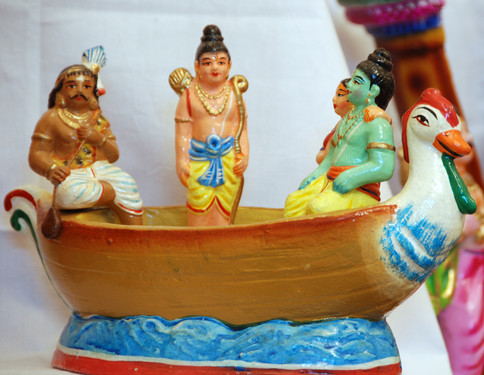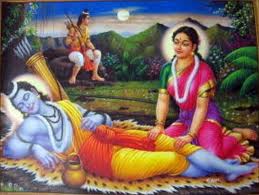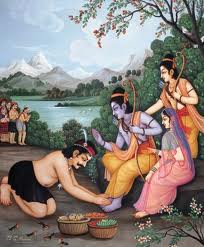Such has been the tremendous inspirational recording by Valmiki that within the Ramayana we have innumerable heroes and heroines about whom epics may be written that can bring out the very best of Indian culture. We first see Guha, just when our heart has still not recovered from the Grecian tragedy enacted in the palace of Dasaratha. Rama has been able to misdirect the people of Ayodhya who had followed him and escape in the chariot driven by Sumantra. Along with Lakshmana and Sita, Rama reaches the river Ganga to a place close to Sringiberapura. The four alight from the chariot and rest under the vast branches of an Ingudi tree. Immediately we see the chief of hunters, Guha advancing towards them.
“Guha, the king of the place, dear to Rama as His own life, a hunter, strong, well-endowed in military strength, having heard of Rama’s arrival went to Him, accompanied by aged ministers and relations.”
Even as Guha stood at a distance, with deference, waiting for permission to approach Rama, the latter went towards him and embraced him. Apparently this was not the first time they were meeting in their lives and Guha must have seen Rama in his princely robes on earlier occasions. Now Guha expressed his sorrow at seeing Rama in a hermit’s dress and said that the Nishada kingdom was at his service. This was a spontaneous gesture and not the empty words of a chieftain in charge of an outpost. It is an ennobling scene where Guha offers everything and Rama takes nothing. “I am under vow,” he says, “and must subsist on fruits and roots.” However, he asks Guha to feed the horses well. They are Dasaratha’s horses and have to make the trip back to Ayodhya. Valmiki then finds positive joy in describing the feast given to the horses, which included milk, barley flour mixed with ghee and grass.
That night, while Rama and Sita slept beneath the tree, Guha Lakshmana and Sumantra were talking to one another while at the same time guarding Rama and Sita. Imaginative re-creations of the scene have been made and critics have tried to analyze the depth of love Lakshmana and Guha had for Rama.
The next day, before his departure, Rama gives Guha a brief lesson in administration, for it is a very difficult task to rule over an empire (raajyam hi duraarakshatamam matam). Then He bids goodbye to this dear friend and is rowed away in a boat with Sita and Lakshmana.
It is a wonderful scene where not a movement Is out of tune. Guha’s words to Lakshmana are revealing. He says that he loves Rama more than anyone else upon the earth and hopes to earn priceless fame (sumahad yasah) as well as gain all that constitutes code of conduct (dharma), wealth (artha) and desire (kama). It was this hunter chieftain who also came first to the mind of Tirumangai Azhvar when he sought to portray the compassion of Rama.
“O Rama! You never looked away
Considering him as poor, inimical,
Of a despicable caste; you poured
Love upon GUHA and said:
‘This gentle, doe-eyed Sita
Is your friend, this my brother Lakshmana
Is your brother too; you said further:
‘Ah, you are my friend, stay with me’.
All this has seized my heart
O compassionate Ranga! Hence
I have reached your feet for refuge.”(Periya Thirumozhi, 5-8-1)
Another episode that reflects Guha’s devotion Rama is when Bharata comes with his mothers and the Kosala army, to request Rama to receive the crown of Ayodhya. Rama, Sita and Lakshmana are already in Chitrakoota across the river Ganga. The high culture of the hunter chieftain comes to fore when he meets Bharata. He is angry because Rama has been reduced to wander in exile; he is incensed suspects Bharata as having come to harm the latter possibly because Guha had helped Rama. But none of these suspicions, which swirl within him, are allowed to peep through in his cultured welcome to Bharata. Sringiberapura is but the pleasure garden of the Ikshvaaku dynasty! On the contrary, Guha insists that, Bharata stay with him at least for a day and accept the hospitality of the hunter class (nishaada-s). Bharata agrees but wonders whether Guha can feed such a big army. Besides, he says that, he only wants to know the way to Bharadvaaja’s ashram from Guha. Guha wonders why Bharata refers to the vast army. Has he really an evil intent towards Rama? Very softly and candidly he asks Bharata whether his intentions are friendly towards Rama. Bharata does not feel insulted at this enquiry from a hunter chieftain who is under the suzerainty of the Ikshvaaku Empire. He simply tells him that he wants to bring back Rama to the throne and immediately Guha’s face lights up (samhrishta vadanah).
Thereafter, it is Guha who has to apply the balm to the wounded heart of Bharata by speaking to him of the wondrous qualities of Rama and the manner has been in which Lakshmana was rendering service to Rama and Sita. These are beautiful passages by the guru Guha. For, here Guha gets elevated to the role of a spiritual teacher, who expounds on filial love. He says, “You must foster such fraternal qualities, not fight amongst yourselves for the sake of vanishing wealth! Remember, how Lakshmana guarded Rama and Sita all through the night as they slept under the Ingudi tree, holding his bow and arrows ready!”
The great Manipravala commentator, Periavmchaan Pillai has a charming reason for Guha’s praise of Lakshmana to Bharata. On being told by Sumantra that Bharata was as noble as Lakshman, Guha could not think of any gift that could be equal to Bharata’s worth. Hence he gave the only gift that could equal Bharata’s nature and please the sorrowing brother. That was an enumeration of the sterling qualities of head and heart possessed by Lakshmana!
Valmiki’s Rama does not forget the nishaada chief in the moment of victory. The victors zoom homewards in the celestial vehicle (Pushpaka), and rest in the ashram of Bharadvaaja. Rama sends Hanuman as an advance emissary to Bharata to announce his return as also to inform Guha of the same.
He feels that, the nishaada chiefwould be extremely happy to learn about his well-being. Here, once again Rama says that Guha is dear to him as his own life: “bhavishyati guhah preetah sa mamaatmasamah sakhaa.” We do not hear of Guha’s name, in the list of recipients of gifts, when Rama was crowned. But Tulsidas, when writing Raamacharitamaanas in Hindi, remembers this ‘real friend’ who was a friend in need. Rama summons Guha and gifts him with clothes and jewels and says: “Remember me, and follow the dictates of dharma always. You must visit Ayodhya now and then and keep in touch, for you are as much my brother as Bharata himself: tum mama sakhaa bharat-sama bhraata.” This closeness between a Kshatriya emperor and a hunter chieftain shows that it is soul-togetherness that fosters human unity and not status, birth, education, or riches.
The Tamil poet Kamban has also lavished high praise on this gentle hunter, whom he describes as the owner of a fleet of thousand boats (aayiram ambikku nmyakan). In keeping with royal protocol, it is Lakshmana who first speaks to Guha and some of the finest verses of the epic are found in this episode. Here, Guha does not ask Bharata about his intentions. Rather he sees Bharata clad in bark, his body full of dust and sporting an unsmiling face that seemed like a moon without its rays. His sorrow was so palpable as if it would melt even a stone. Immediately Guha’s bow slides away from his hand and he begins talking to himself:”
“This young man resembles
My Lord; he also resembles
The brother who has come;
He wears a hermit’s garb.
There is no end to his pain;
He salutes the direction.
Will my Lord’s younger siblings
Ever commit a wrong?”
This description is in keeping with the turn given by the Adhyatma Ramayana, which finds Guha recognizing the nobility of Bharata by merely looking at him. Indeed Tulsidas and Thunjathu Ezhuthachchan have followed the same version. The maternal heart in Sita no doubt recognized a rare purity in Guha though they had but a brief encounter in Sringiberapura. When lost in the folds of memory in Ashoka grove, that encounter comes to her mind again, and the words of Rama uttered then:
“Her eyes grew moist as the words of Rama
Uttered to the poor hunter, the boatman
Of the deep Ganga in flood came to her again:
My younger brother is also yours;
You are my friend;
Sita is your sister-in-law.”
What were the thoughts of Sita, which followed this remembrance? Life on earth is unfathomable and always in floods. The boatman can yet help us cross this ocean of samsara, this ocean of shore-less misery. Guha had done that once, and helped the royal couple along with Lakshmana cross the Ganga in flood. Sita holds on to the hope that they will cross the Ganges with the boatman’s help again and return to the safety of Ayodhya. Sita, for once, puts on the garb of an aspirant. Remembering such great, stainless devotees is a sure way for Srivaishnavas to gain the presence of the Lord.
Source: Nrisimhapriya 2004













Permission for the Pictures taken for Pictorial Ramayana from your website
Dear Sir,
I request you to kindly give me permission to use the pictures which I have taken from your website for the use of our book named ‘Pictorial Ramayana’ which would be printed by the book trust Sri Sathya Sai Books and publications, Prasanthi Nilayam.
Regards
Dr. Gowri
Email: dr9992001@yahoo.com